
Hoyt Peak is a 10,506 feet (3,202 m) summit located on the shared border of Yellowstone National Park and North Absaroka Wilderness, in Park County, Wyoming.
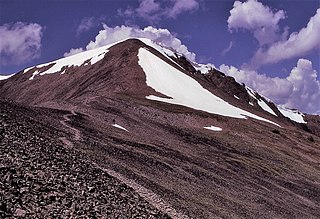
Avalanche Peak is a 10,568-foot (3,221 m) summit located on the shared border of Yellowstone National Park and North Absaroka Wilderness, in Park County, Wyoming. It is part of the Absaroka Range. It features a large bowl covered in scree and is popular with hikers for its view of Yellowstone Lake and the surrounding area. The mountain's name was officially adopted in 1930 by the United States Board on Geographic Names.
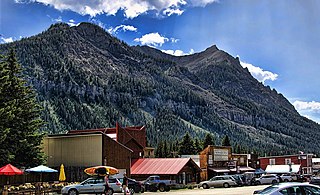
Republic Mountain is a 10,162-foot-elevation (3,097-meter) mountain summit located in Park County, Wyoming, United States.

Cutoff Mountain is a 10,695-foot (3,260-metre) mountain summit located in Park County, Montana.
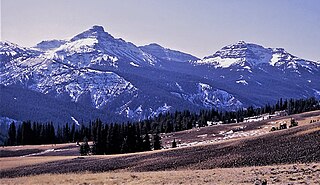
Pollux Peak is an 11,063-foot-elevation (3,372-meter) mountain summit located in Yellowstone National Park, in Park County, Wyoming, United States.

Saddle Mountain is a 10,670-foot-elevation (3,250-meter) mountain summit located in Yellowstone National Park, in Park County, Wyoming, United States.

Top Notch Peak is a 10,245-foot-elevation (3,123 meter) mountain summit located in Yellowstone National Park, in Park County, Wyoming, United States.
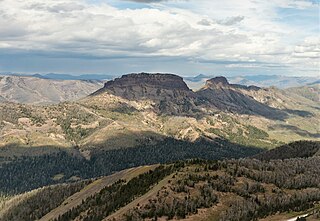
Silvertip Peak is a 10,645-foot-elevation (3,245-meter) mountain summit located in Park County, Wyoming, United States.

Hoodoo Peak is a 10,571-foot-elevation (3,222-meter) mountain summit located in Park County, Wyoming, United States.

Black Mountain is a 10,941-foot (3,335-metre) summit located in Park County, Montana, United States.
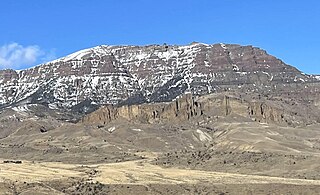
Jim Mountain is a 10,430-foot-elevation (3,179-meter) summit in Park County, Wyoming, United States.

Sheep Mountain is a 10,552-foot (3,216-metre) mountain summit in Park County, Montana, United States.

Sheep Mountain is a 10,097-foot (3,078-metre) mountain summit in Park County, Montana, United States.

Thunder Mountain is an 11,441-foot (3,487-metre) summit in Carbon County, Montana, United States.

Indian Peak is a 10,929-foot-elevation (3,331-meter) mountain summit in Park County, Wyoming, United States.

Hurricane Mesa is an 11,069-foot-elevation (3,374-meter) mountain summit in Park County, Wyoming, United States.

Sunset Peak is a 10,201-foot (3,109-metre) summit in Park County, Montana, United States.

Mount Humphreys is an 11,019-foot-elevation (3,359-meter) mountain summit in Park County, Wyoming, United States.

Table Mountain is an 11,069-foot-elevation (3,374-meter) mountain summit in Park County, Wyoming, United States.

Hellroaring Mountain is an 8,374-foot (2,552-metre) summit in Park County, Montana, United States.





























